 ALSO BY WILLIS BARNSTONE
ALSO BY WILLIS BARNSTONE  Biblical and Religious The Other Bible: Jewish Pseudepigrapha, Christian Apocrypha, Gnostic Scriptures, Kabbalah, Dead Sea Scrolls The Apocalypse: The Book of Revelation The New Covenant: Four Gospels and Apocalypse The Restored New Testament The Poems of Jesus Christ The Gnostic Bible (with Marvin Meyer) Essential Gnostic Scriptures (with Marvin Meyer) Poetry Poems of Exchange From This White Island Sanctuary of the Sun: Mexico Antijournal A Day in the Country (for children) New Faces of China China Poems Overheard A Snow Salmon Reached the Andes Lake The Alphabet of Night Ten Gospels and a Nightingale Five A.M. in Beijing Funny Ways of Staying Alive The Secret Reader: 501 Sonnets Algebra of Night: New and Selected Poems, 19481998 Life Watch Caf de lAube Paris / Dawn Caf in Paris Stickball on 88th Street Moonbook and Sunbook ABC of Translation: Poems on Translation Mexico in My Heart: New and Selected Poems Memoirs From Hawthornes Gloom to a Whitewashed Island Sunday Morning in Fascist Spain: A European Memoir, 19481953 With Borges on an Ordinary Evening in Buenos Aires We Jews and Blacks: Memoir with Poems Borges at 80 Literary Criticism Miguel de Cervantess Rinconete y Cortadillo The Poetics of Ecstasy: From Sappho to Borges The Poetics of Translation: History, Theory, Practice Libretto for Opera An American in China (music by David Michael Hertz) Translations Eighty Poems of Antonio Machado The Other Alexander: A Greek Novel by Margarita Liberaki (with Helle Tzalopoulou Barnstone) Mexico Before Cortez: Art, History, Legend by Ignacio Bernal Physiologus Theobaldli Episcopi Bishop Theobalds Bestiary Sappho: Lyrics in the Original Greek with an English Translation Greek Lyric Poetry The Poems of Saint John of the Cross The Song of Songs: Shir Hashirim My Voice Because of You by Pedro Salinas The Unknown Light: The Poems of Fray Luis de Len A Bird of Paper: Poems of Vicente Aleixandre (with David Garrison) The Art of Worldly Wisdom by Gracin Baltar Cntico spiritual: The Spiritual Canticle of St. John of the Cross La fianza Satisfecha: The Outrageous Saint by Lope de Vega La cena del rey Baltazar (The Banquet of King Balthazar) by Pedro Caldern de la Barca Radiance and Death of Joaqun Murieta by Pablo Neruda The Dream Below the Sun: Poems by Antonio Machado The Courage of the Rainbow by Bronislava Volkav Laughing Lost in the Mountains: Poems of Wang Wei (with Tony Barnstone and Xu Haixin) To Touch the Sky: Poems of Mystical, Spiritual and Metaphysical Light Six Masters of the Spanish Sonnet: Francisco de Quevedo, Sor Juana Ins de la Cruz, Antonio Machado, Federico Garcia Lorca, Jorge Luis Borges, Miguel Hernndez Border of a Dream: Selected Poems of Antonio Machado Sonnets to Orpheus: Rainer Maria Rilke Sweetbitter Love: Poems of Sappho (bilingual edition) The Complete Poems of Sappho The Poems of Mao Zedong Ancient Greek Lyrics Love Poems by Pedro Salinas: My Voice Because of You and Letter Poems to Katherine Anthologies / Editions Concrete Poetry: A World View (with Mary Ellen Solt) Spanish Poetry, from Its Beginning through the Nineteenth Century Modern European Poetry Eighteen Texts: Writings by Contemporary Greek Authors (with Edmund Keeley) A Book of Women Poets from Antiquity to Now (with Aliki Barnstone) Literatures of Asia, Africa, and Latin America (with Tony Barnstone) Literatures of Latin America Literatures of the Middle East (with Tony Barnstone) Twenty-four Conversations with Borges POETS OF
Biblical and Religious The Other Bible: Jewish Pseudepigrapha, Christian Apocrypha, Gnostic Scriptures, Kabbalah, Dead Sea Scrolls The Apocalypse: The Book of Revelation The New Covenant: Four Gospels and Apocalypse The Restored New Testament The Poems of Jesus Christ The Gnostic Bible (with Marvin Meyer) Essential Gnostic Scriptures (with Marvin Meyer) Poetry Poems of Exchange From This White Island Sanctuary of the Sun: Mexico Antijournal A Day in the Country (for children) New Faces of China China Poems Overheard A Snow Salmon Reached the Andes Lake The Alphabet of Night Ten Gospels and a Nightingale Five A.M. in Beijing Funny Ways of Staying Alive The Secret Reader: 501 Sonnets Algebra of Night: New and Selected Poems, 19481998 Life Watch Caf de lAube Paris / Dawn Caf in Paris Stickball on 88th Street Moonbook and Sunbook ABC of Translation: Poems on Translation Mexico in My Heart: New and Selected Poems Memoirs From Hawthornes Gloom to a Whitewashed Island Sunday Morning in Fascist Spain: A European Memoir, 19481953 With Borges on an Ordinary Evening in Buenos Aires We Jews and Blacks: Memoir with Poems Borges at 80 Literary Criticism Miguel de Cervantess Rinconete y Cortadillo The Poetics of Ecstasy: From Sappho to Borges The Poetics of Translation: History, Theory, Practice Libretto for Opera An American in China (music by David Michael Hertz) Translations Eighty Poems of Antonio Machado The Other Alexander: A Greek Novel by Margarita Liberaki (with Helle Tzalopoulou Barnstone) Mexico Before Cortez: Art, History, Legend by Ignacio Bernal Physiologus Theobaldli Episcopi Bishop Theobalds Bestiary Sappho: Lyrics in the Original Greek with an English Translation Greek Lyric Poetry The Poems of Saint John of the Cross The Song of Songs: Shir Hashirim My Voice Because of You by Pedro Salinas The Unknown Light: The Poems of Fray Luis de Len A Bird of Paper: Poems of Vicente Aleixandre (with David Garrison) The Art of Worldly Wisdom by Gracin Baltar Cntico spiritual: The Spiritual Canticle of St. John of the Cross La fianza Satisfecha: The Outrageous Saint by Lope de Vega La cena del rey Baltazar (The Banquet of King Balthazar) by Pedro Caldern de la Barca Radiance and Death of Joaqun Murieta by Pablo Neruda The Dream Below the Sun: Poems by Antonio Machado The Courage of the Rainbow by Bronislava Volkav Laughing Lost in the Mountains: Poems of Wang Wei (with Tony Barnstone and Xu Haixin) To Touch the Sky: Poems of Mystical, Spiritual and Metaphysical Light Six Masters of the Spanish Sonnet: Francisco de Quevedo, Sor Juana Ins de la Cruz, Antonio Machado, Federico Garcia Lorca, Jorge Luis Borges, Miguel Hernndez Border of a Dream: Selected Poems of Antonio Machado Sonnets to Orpheus: Rainer Maria Rilke Sweetbitter Love: Poems of Sappho (bilingual edition) The Complete Poems of Sappho The Poems of Mao Zedong Ancient Greek Lyrics Love Poems by Pedro Salinas: My Voice Because of You and Letter Poems to Katherine Anthologies / Editions Concrete Poetry: A World View (with Mary Ellen Solt) Spanish Poetry, from Its Beginning through the Nineteenth Century Modern European Poetry Eighteen Texts: Writings by Contemporary Greek Authors (with Edmund Keeley) A Book of Women Poets from Antiquity to Now (with Aliki Barnstone) Literatures of Asia, Africa, and Latin America (with Tony Barnstone) Literatures of Latin America Literatures of the Middle East (with Tony Barnstone) Twenty-four Conversations with Borges POETS OF
THE BIBLE  From Solomons Song of Songs
From Solomons Song of Songs
to Johns Book of Revelation Translated from
the Hebrew and the Greek by WILLIS BARNSTONE  W. W. NORTON & COMPANY Independent Publishers Since 1923 NEW YORK | LONDON Copyright 2017 by Willis Barnstone All rights reserved
W. W. NORTON & COMPANY Independent Publishers Since 1923 NEW YORK | LONDON Copyright 2017 by Willis Barnstone All rights reserved
First Edition For information about permission to reproduce selections from this book, write to Permissions, W. W.
Norton & Company, Inc., 500 Fifth Avenue, New York, NY 10110 For information about special discounts for bulk purchases, please contact W. W. Norton Special Sales at specialsales@wwnorton.com or 800-233-4830 Book design by Helene Berinsky
Production manager: Julia Druskin
Jacket design by Jennifer Carrow ISBN 978-0-393-24389-5 ISBN 978-0-393-24390-1 (e-book) W. W. Norton & Company, Inc.
500 Fifth Avenue, New York, N.Y. W. W.
Norton & Company Ltd.
15 Carlisle Street, London W1D 3BS  The Angel of the Divine Presence Bringing Eve to Adam by William Blake. for Robert Alter who led the way
The Angel of the Divine Presence Bringing Eve to Adam by William Blake. for Robert Alter who led the way
Jill Bialosky for permitting me voyage
Sarah Handler whose eye lighted each word CONTENTS Adjusting type size may change line breaks. Landscape mode may help to preserve line breaks. T he worlds great poetry resides in the Bible. In the Hebrew Bible we hear Solomon carol in Song of Songs, David chant in Psalms, Job and God debate in Job, and Isaiah, Jeremiah, and Amos declaim amid the prophets; in the Greek Scriptures we hear Jesus speak wisdom verse in Gospels, Paul exult in Corinthians, John and James preach musically in Letters, and John of Patmos roar epically in Revelation. Although these are among the most familiar biblical figures, because their words are set as prose few have traditionally associated them with poetry. Consider William Blake, Walt Whitman, and Herman Melville.
Melville is the greatest hidden author of the prose poem. These great poets in English capture the image and song. And those tales and harmonic resonance are immersed in their poetry and have profoundly fashioned their work. Today it seems unimaginable that the Psalms and Song of Songs were once printed as prose. Without that inspired biblical song locked in prose, as Emily Dickinson called the concealed holy poems, would we have Shakespeare, Herbert, Milton, Blake, Whitman, Dickinson, Melville, Hopkins, Yeats, Joyce, Eliot, and Dylan Thomas? Their work would be diminished. The Bible is a very large part of the language globe that is a peoples language and culture, for both the faithful and secular.
The Bible enters our language sphere through the liberating act of translation. We consume that translation, as in the King James Version, as a work born in English. Strictly speaking, it is a reborn version in English. The fact that so-called literal words of the Bible are never literal but a translation (often a translation of a translation) is lost to most readers. Bible speech is our atlas and guide to language, literature, and philosophy. The great voices in Genesis, Solomon, Job, and Psalms, and Gospels, Paul, and Revelation keep the biblical fountain flowing with magnificent speech.
It continues in contemporary poetry from T. S. Eliot and Dylan Thomas to Joan Baez, John Lennon, Theodore Roethke, and C. K. Williams. Consider the following lines.
Are they from Walt Whitmans Song of the Broad Axe? Yes, my smart students at Wesleyan University voiced unanimously. They knew their Walt. The carpenter measures with a line and makes an outline with a marker; he roughs it out with chisels and marks it with compasses. He shapes it in the form of man, of man in all his glory, that it may dwell in a shrine. He cut down cedars, or perhaps took a cypress or oak. He let it grow among the trees of the forest, or planted a pine, and the rain made it grow.
It is mans fuel for burning; some of it he takes and warms himself, he kindles a fire and bakes bread. This passage is not, however, from Whitman but one of his inspirations, Isaiah (44.25), a world poet who wrote in the mid-sixth century B.C.E. Yet Whitman heard poetry concealed in prose in the Old Testament decades before the prophets lines were set as poetry. As a son of Quakers, he knew his scriptures. The grand poets, who wrote in echoing couplets, did not need to have the Hebrew text lineated as poetry to be swayed. They were overwhelmed especially by the prophets and by Revelation.
Next page
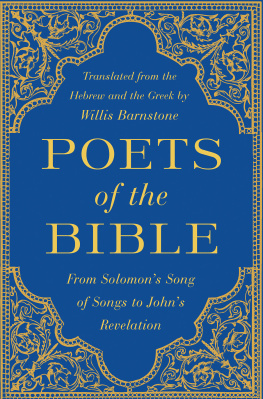

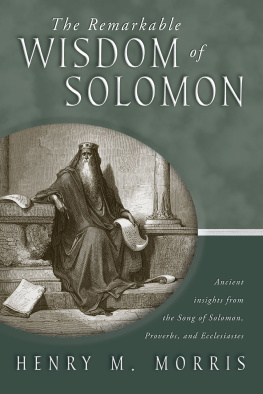
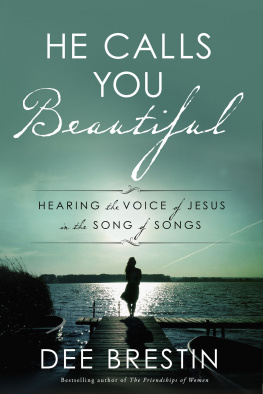
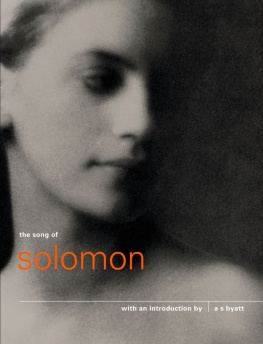
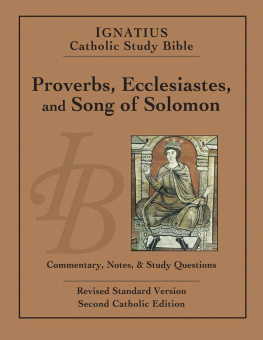
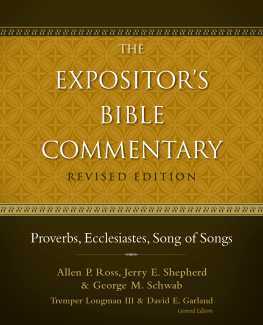
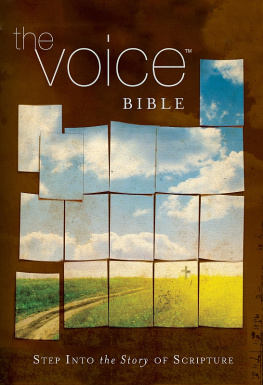
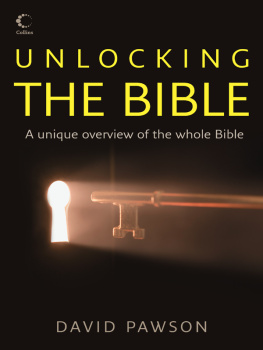
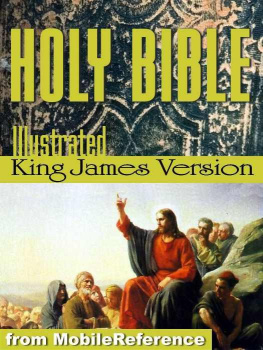
 ALSO BY WILLIS BARNSTONE
ALSO BY WILLIS BARNSTONE  Biblical and Religious The Other Bible: Jewish Pseudepigrapha, Christian Apocrypha, Gnostic Scriptures, Kabbalah, Dead Sea Scrolls The Apocalypse: The Book of Revelation The New Covenant: Four Gospels and Apocalypse The Restored New Testament The Poems of Jesus Christ The Gnostic Bible (with Marvin Meyer) Essential Gnostic Scriptures (with Marvin Meyer) Poetry Poems of Exchange From This White Island Sanctuary of the Sun: Mexico Antijournal A Day in the Country (for children) New Faces of China China Poems Overheard A Snow Salmon Reached the Andes Lake The Alphabet of Night Ten Gospels and a Nightingale Five A.M. in Beijing Funny Ways of Staying Alive The Secret Reader: 501 Sonnets Algebra of Night: New and Selected Poems, 19481998 Life Watch Caf de lAube Paris / Dawn Caf in Paris Stickball on 88th Street Moonbook and Sunbook ABC of Translation: Poems on Translation Mexico in My Heart: New and Selected Poems Memoirs From Hawthornes Gloom to a Whitewashed Island Sunday Morning in Fascist Spain: A European Memoir, 19481953 With Borges on an Ordinary Evening in Buenos Aires We Jews and Blacks: Memoir with Poems Borges at 80 Literary Criticism Miguel de Cervantess Rinconete y Cortadillo The Poetics of Ecstasy: From Sappho to Borges The Poetics of Translation: History, Theory, Practice Libretto for Opera An American in China (music by David Michael Hertz) Translations Eighty Poems of Antonio Machado The Other Alexander: A Greek Novel by Margarita Liberaki (with Helle Tzalopoulou Barnstone) Mexico Before Cortez: Art, History, Legend by Ignacio Bernal Physiologus Theobaldli Episcopi Bishop Theobalds Bestiary Sappho: Lyrics in the Original Greek with an English Translation Greek Lyric Poetry The Poems of Saint John of the Cross The Song of Songs: Shir Hashirim My Voice Because of You by Pedro Salinas The Unknown Light: The Poems of Fray Luis de Len A Bird of Paper: Poems of Vicente Aleixandre (with David Garrison) The Art of Worldly Wisdom by Gracin Baltar Cntico spiritual: The Spiritual Canticle of St. John of the Cross La fianza Satisfecha: The Outrageous Saint by Lope de Vega La cena del rey Baltazar (The Banquet of King Balthazar) by Pedro Caldern de la Barca Radiance and Death of Joaqun Murieta by Pablo Neruda The Dream Below the Sun: Poems by Antonio Machado The Courage of the Rainbow by Bronislava Volkav Laughing Lost in the Mountains: Poems of Wang Wei (with Tony Barnstone and Xu Haixin) To Touch the Sky: Poems of Mystical, Spiritual and Metaphysical Light Six Masters of the Spanish Sonnet: Francisco de Quevedo, Sor Juana Ins de la Cruz, Antonio Machado, Federico Garcia Lorca, Jorge Luis Borges, Miguel Hernndez Border of a Dream: Selected Poems of Antonio Machado Sonnets to Orpheus: Rainer Maria Rilke Sweetbitter Love: Poems of Sappho (bilingual edition) The Complete Poems of Sappho The Poems of Mao Zedong Ancient Greek Lyrics Love Poems by Pedro Salinas: My Voice Because of You and Letter Poems to Katherine Anthologies / Editions Concrete Poetry: A World View (with Mary Ellen Solt) Spanish Poetry, from Its Beginning through the Nineteenth Century Modern European Poetry Eighteen Texts: Writings by Contemporary Greek Authors (with Edmund Keeley) A Book of Women Poets from Antiquity to Now (with Aliki Barnstone) Literatures of Asia, Africa, and Latin America (with Tony Barnstone) Literatures of Latin America Literatures of the Middle East (with Tony Barnstone) Twenty-four Conversations with Borges POETS OF
Biblical and Religious The Other Bible: Jewish Pseudepigrapha, Christian Apocrypha, Gnostic Scriptures, Kabbalah, Dead Sea Scrolls The Apocalypse: The Book of Revelation The New Covenant: Four Gospels and Apocalypse The Restored New Testament The Poems of Jesus Christ The Gnostic Bible (with Marvin Meyer) Essential Gnostic Scriptures (with Marvin Meyer) Poetry Poems of Exchange From This White Island Sanctuary of the Sun: Mexico Antijournal A Day in the Country (for children) New Faces of China China Poems Overheard A Snow Salmon Reached the Andes Lake The Alphabet of Night Ten Gospels and a Nightingale Five A.M. in Beijing Funny Ways of Staying Alive The Secret Reader: 501 Sonnets Algebra of Night: New and Selected Poems, 19481998 Life Watch Caf de lAube Paris / Dawn Caf in Paris Stickball on 88th Street Moonbook and Sunbook ABC of Translation: Poems on Translation Mexico in My Heart: New and Selected Poems Memoirs From Hawthornes Gloom to a Whitewashed Island Sunday Morning in Fascist Spain: A European Memoir, 19481953 With Borges on an Ordinary Evening in Buenos Aires We Jews and Blacks: Memoir with Poems Borges at 80 Literary Criticism Miguel de Cervantess Rinconete y Cortadillo The Poetics of Ecstasy: From Sappho to Borges The Poetics of Translation: History, Theory, Practice Libretto for Opera An American in China (music by David Michael Hertz) Translations Eighty Poems of Antonio Machado The Other Alexander: A Greek Novel by Margarita Liberaki (with Helle Tzalopoulou Barnstone) Mexico Before Cortez: Art, History, Legend by Ignacio Bernal Physiologus Theobaldli Episcopi Bishop Theobalds Bestiary Sappho: Lyrics in the Original Greek with an English Translation Greek Lyric Poetry The Poems of Saint John of the Cross The Song of Songs: Shir Hashirim My Voice Because of You by Pedro Salinas The Unknown Light: The Poems of Fray Luis de Len A Bird of Paper: Poems of Vicente Aleixandre (with David Garrison) The Art of Worldly Wisdom by Gracin Baltar Cntico spiritual: The Spiritual Canticle of St. John of the Cross La fianza Satisfecha: The Outrageous Saint by Lope de Vega La cena del rey Baltazar (The Banquet of King Balthazar) by Pedro Caldern de la Barca Radiance and Death of Joaqun Murieta by Pablo Neruda The Dream Below the Sun: Poems by Antonio Machado The Courage of the Rainbow by Bronislava Volkav Laughing Lost in the Mountains: Poems of Wang Wei (with Tony Barnstone and Xu Haixin) To Touch the Sky: Poems of Mystical, Spiritual and Metaphysical Light Six Masters of the Spanish Sonnet: Francisco de Quevedo, Sor Juana Ins de la Cruz, Antonio Machado, Federico Garcia Lorca, Jorge Luis Borges, Miguel Hernndez Border of a Dream: Selected Poems of Antonio Machado Sonnets to Orpheus: Rainer Maria Rilke Sweetbitter Love: Poems of Sappho (bilingual edition) The Complete Poems of Sappho The Poems of Mao Zedong Ancient Greek Lyrics Love Poems by Pedro Salinas: My Voice Because of You and Letter Poems to Katherine Anthologies / Editions Concrete Poetry: A World View (with Mary Ellen Solt) Spanish Poetry, from Its Beginning through the Nineteenth Century Modern European Poetry Eighteen Texts: Writings by Contemporary Greek Authors (with Edmund Keeley) A Book of Women Poets from Antiquity to Now (with Aliki Barnstone) Literatures of Asia, Africa, and Latin America (with Tony Barnstone) Literatures of Latin America Literatures of the Middle East (with Tony Barnstone) Twenty-four Conversations with Borges POETS OF From Solomons Song of Songs
From Solomons Song of Songs W. W. NORTON & COMPANY Independent Publishers Since 1923 NEW YORK | LONDON Copyright 2017 by Willis Barnstone All rights reserved
W. W. NORTON & COMPANY Independent Publishers Since 1923 NEW YORK | LONDON Copyright 2017 by Willis Barnstone All rights reserved The Angel of the Divine Presence Bringing Eve to Adam by William Blake. for Robert Alter who led the way
The Angel of the Divine Presence Bringing Eve to Adam by William Blake. for Robert Alter who led the way